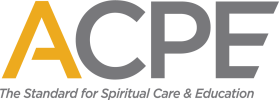A program embodies ACPE Values and evidences ethical conduct and responsibility.
Rationale
An ACPE Accredited Program and those who work and learn therein are expected to act with integrity and to ensure that a program’s activities are in compliance with both the words and the spirit of ACPE’s Professional Ethics Commission and common practice within the field of professional spiritual care. Attention to the ACPE values of diversity and inclusion, integrity, curiosity, process, and service in policy, practice, and curriculum helps ensure a culture of ethical accountability and responsibility.
Indicators
In assessing this area, reviewers will look at the program’s:
A. Embodiment of ACPE values in the management of its educational program and conduct of its business
B. Policies and practices designed to promote both awareness and understanding of the diversity of race, ethnicity, religious/spiritual tradition, sexual orientation, gender identity, gender expression, age, disability, and culture that are part of the fabric of ACPE
C. Alignment and consistency with ACPE values and program policies and practices
D. Ensuring adherence to the ACPE Code of Professional Ethics for its educators and for its students where appropriate
E. Learning environment that promotes and embodies ACPE Values, Ethical Integrity, and Cultural Awareness/Responsiveness
F. For programs that utilize video conferencing for any portion of their program, how the program ensures all ACPE Values, Ethical Integrity, and Cultural Awareness/Responsiveness are embedded.
Items that must be included in the program’s portfolio:
- Professional development opportunities for staff to gain training in cultural and religious diversity and racial equity
- Professional development opportunities designed for students to gain training in cultural and religious diversity and racial equity
- Feedback from advisory group and other stakeholders relative to the ethical integrity of its educational program and center business practices
- Non-Discrimination policies
- Examples of learning activities and evaluation strategies demonstrating the development and integration of inter-cultural competence
- Examples of how student support services are culturally responsive in serving the needs of your students
- A presentation on how the accredited center ensures that all students and personnel are informed of and abide by (as applicable) the ACPE Code of Professional Ethics, the role of the Professional Ethics Commission of ACPE, the Professional Ethics Complaint Process, the Educational Complaint Process Against an Accredited Program, and the policy for Complaints Against the Accreditation Commission
- A presentation on how the program creates a relational learning environment that models affirmation and respect for diversity and difference, and fosters mutual trust, respect, openness, challenge, conflict, and confrontation


